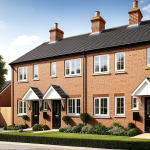Practical eco-friendly home improvement ideas for UK homes
Exploring eco-friendly home improvements UK offers a practical path to greener living and lasting benefits. Popular sustainable upgrades empower homeowners to reduce energy use and lower bills while enhancing comfort. For example, installing energy-efficient windows or LED lighting contributes both to green living objectives and cost savings.
Key benefits of these eco-friendly renovations include improved air quality, increased property value, and reduced carbon footprints. Many UK homes can leverage government incentives designed to ease the transition to sustainability. These incentives often cover a portion of costs, making upgrades more affordable and attractive.
Have you seen this : How Can You Elevate Your Living Space with Unique UK Styles?
In addition, compliance with UK regulations ensures that home improvements meet environmental and safety standards. Being aware of these regulations helps homeowners avoid costly mistakes. Considering the variety of options, such as solar panels, efficient heating, and sustainable materials, empowers well-informed decisions tailored to specific needs.
By combining sustainable upgrades with available grants and government support, UK homeowners can achieve meaningful environmental impact within practical budgets. Embracing eco-friendly home improvements UK creates a healthier, more efficient living space that benefits both residents and the planet.
In parallel : How Can Small Changes Transform the Comfort of Your Home?
Energy-efficient insulation and draught-proofing
Improving insulation is a cornerstone of eco-friendly home improvements UK. In UK homes, common insulation types include loft, wall, and floor insulation. Loft insulation is often the easiest and most cost-effective upgrade, significantly reducing heat loss through the roof. Wall insulation can be either solid wall or cavity wall types, each chosen based on the property’s construction. Floor insulation, though less common, helps to maintain warm indoor temperatures and prevents heat escaping below.
Draught-proofing complements insulation by sealing gaps around windows and doors, stopping cold air ingress and warm air escape. Simple methods, such as weatherstripping or installing door sweeps, improve comfort and energy efficiency without major renovations.
Costs for these upgrades can vary, but many UK homeowners benefit from grants that reduce upfront expenses. Payback periods for insulation and draught-proofing often range from 3 to 7 years depending on home size and upgrade quality. UK regulation standards encourage adequate insulation levels, ensuring energy efficient homes meet environmental targets.
Together, insulation and draught-proofing create a warmer, less costly home environment, underpinning sustainable upgrades and enhancing long-term savings while supporting green living ambitions.
Renewable energy solutions for UK households
Enhancing eco-friendly home improvements UK involves integrating renewable energy sources like solar panels and heat pumps. Solar panels convert sunlight into electricity, offering a clean, sustainable energy form directly accessible for UK homes. Installing solar panels not only reduces electricity bills but often benefits from government-backed incentives such as Feed-in Tariffs, which pay for surplus energy exported back to the grid. This system supports green living by encouraging home energy generation with financial rewards.
Heat pumps provide an efficient alternative heating method, using ambient air or ground heat to warm homes sustainably. Air-source heat pumps extract heat from outside air, while ground-source systems draw warmth from beneath the ground. Both types contribute significantly to lowering carbon emissions and fuel costs, aligning with the goals of sustainable upgrades.
The UK’s Smart Export Guarantee scheme further incentivises renewable solutions by allowing homeowners to sell excess generated energy to suppliers. These combined options make renewable energy technologies practical and cost-effective choices for enhancing UK homes’ energy efficiency and overall sustainability. Investing in such systems supports long-term savings and helps meet national environmental targets.
Efficient heating and water systems
Upgrading to efficient boilers is a practical eco-friendly home improvement for UK homes targeting energy savings. Modern boilers, including high-efficiency and combi boilers, convert fuel to heat more effectively, reducing energy waste and lowering bills. These systems comply with UK regulations promoting energy efficiency.
In addition, installing smart thermostats allows precise temperature control, learning household patterns and adjusting heating schedules accordingly. This optimises energy use, cuts costs, and enhances comfort. Many UK homeowners find smart thermostats integrate well with existing heating systems, creating a user-friendly and energy-conscious setup.
Water conservation also plays a key role in sustainable upgrades. Fitting low-flow taps, showers, and dual flush toilets substantially reduces water usage without compromising performance. Using less water lowers utility bills and supports green living goals by conserving a critical resource.
Together, these efficient heating and water measures foster substantial UK energy savings, supporting eco-friendly renovations. They offer practical benefits such as ease of installation, compatibility with existing infrastructure, and eligibility for government incentives. Implementing these sustainable upgrades is an achievable step toward greener, more cost-effective home environments.
Eco-friendly materials and sustainable practices
Choosing sustainable materials is vital for successful eco-friendly home improvements UK. Using recycled or reclaimed materials reduces demand for new resources and cuts waste. This practice aligns perfectly with green living principles while supporting circular economies.
Natural building products, such as hemp, cork, or sheep’s wool insulation, provide excellent thermal performance with low environmental impact. Moreover, selecting sustainably sourced wood ensures forests are responsibly managed, balancing ecological health with construction needs. Non-toxic, low-VOC (volatile organic compound) paints and finishes improve indoor air quality and diminish harmful emissions, promoting healthier living environments in UK homes.
Durability is another key factor. Opting for long-lasting materials and fixtures reduces the frequency of replacements, lowering overall resource consumption. For example, bamboo flooring and recycled metal elements combine strength with sustainability.
Incorporating these eco renovation choices supports a holistic approach to greener homes. They don’t just reduce environmental footprints but also enhance property value. By thoughtfully selecting materials, UK homeowners can achieve sustainable upgrades that endure, blending practicality with planet-friendly innovation seamlessly.
Accessing grants, incentives, and support schemes
Navigating UK energy grants can significantly reduce the cost of eco-friendly home improvements UK. The government’s Green Homes Grant and the Energy Company Obligation (ECO) scheme provide financial assistance for sustainable upgrades like insulation and heating systems. These programs aim to boost green living by making efficient renovations more affordable for UK homeowners.
How do these schemes work? The Green Homes Grant offers vouchers covering part of the installation costs for approved measures, while ECO targets low-income and vulnerable households, funding specific energy-saving improvements. Both schemes require work to comply with UK standards to ensure lasting benefits.
Additional local incentives may also be available, often varying by region or council priorities. Researching up-to-date resources or consulting energy advisors can help identify eligible grants and deadlines.
By leveraging government support, UK homes can access practical, cost-effective upgrades that reduce energy bills and environmental impact. This support complements other sustainable upgrades, making eco-renovations financially viable and encouraging widespread adoption of greener living practices across the country.
Practical eco-friendly home improvement ideas for UK homes
Adopting eco-friendly home improvements UK offers significant advantages for modern homeowners. Popular sustainable upgrades like upgrading insulation, fitting efficient heating systems, or installing renewable energy solutions all contribute to reducing energy consumption and fostering green living. These practical changes help lower utility bills while improving indoor comfort.
For UK homes, benefits of eco-friendly renovations extend beyond immediate savings. Enhanced air quality, increased property value, and a lowered environmental impact are key outcomes. Many improvements align with current UK regulations focused on sustainability and safety, ensuring long-term compliance and performance. Awareness of these standards enables homeowners to select appropriate upgrades without risking costly code violations.
Additionally, government incentives play an essential role in supporting eco-friendly initiatives. Programs such as grants and subsidies often cover part of the costs for sustainable upgrades, making these investments more affordable and appealing. These schemes are tailored to encourage widespread adoption of green practices across diverse UK households.
In summary, combining energy-saving technologies, sustainable materials, and available government support provides a comprehensive framework for effective eco-friendly home improvements UK. This approach empowers homeowners to build more efficient, healthier, and environmentally responsible living spaces.





